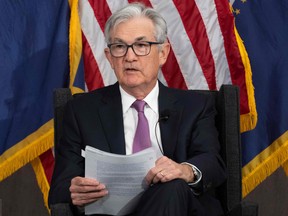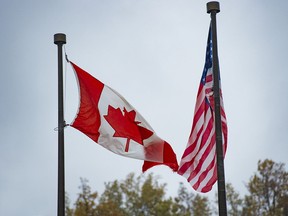Surprise interest rate hikes from Canada and Australia suggest larger markets may also need to tighten further
Article content
The Bank of Canada‘s surprise decision to raise its benchmark interest rate June 7 sent ripples through global bond markets and has added an extra dose of uncertainty to the upcoming June 14 rate announcement from the U.S. Federal Reserve.
Advertisement 2
Article content
Both the Canadian and Australian central banks surprised markets by raising rates last week, leading to a slump in global bonds and speculation that the Fed might follow suit. The Fed, however, has been vocal in signalling that it will hold this week, with markets placing odds of a hold at 75 per cent. That looked even more likely after May inflation checked in Tuesday at four per cent, the lowest level in two years.
Article content
But the Bank of Canada’s 25-basis-point hike to 4.75 per cent ended what had been a five-month pause, suggesting to some that the economic winds were changing, and increasing the potential the Fed isn’t done raising rates.
What happened?
Following the Bank of Canada’s announcement, the yield on two-year Canadian bonds tacked on more than 20 basis points.
Article content
Advertisement 3
Article content
Derek Holt, head of capital markets economics at Scotiabank, said the central bank’s decision “blew a foul stench over world bond markets.”
Avery Shenfeld, chief economist of CIBC Capital Markets, said that by not waiting until July and appearing to be less patient, the Bank of Canada had also made another move upward more likely.
“Bond yields in both countries could see further upward pressure from here to September, as markets will price in risks of subsequent hikes for a while, and will also feel the impact of a rush of U.S. Treasury supply as the government replenishes its cash position with the debt ceiling deal now achieved,” he said.
What did the Canadian hike signal?
Though the direct impact was limited, ending the pause launched in January gave markets something of a reality check in terms of the risks surrounding the outlook for major central banks such as the Fed, said Royce Mendes, head of macro strategy at Desjardins Capital Markets.
Advertisement 4
Article content

“Market participants are viewing the Bank of Canada’s return to rate hikes as a bit of a canary in a coal mine,” Mendes said, adding that the Bank of Canada’s move could be a leading indicator of what other central banks might have to do to contain inflationary pressures.
Canada, however, did not act alone. Stephen Brown, deputy chief North America economist at Capital Economics, said the Reserve Bank of Australia hiking last week against consensus expectations of a hold was also a major part of the reaction from global markets.
“It’s this sort of accumulation of evidence that maybe central banks across the world are going to have to do a bit more in order to get inflation under control, which has had this effect on global markets,” Brown said.
Advertisement 5
Article content
Is it unusual for global markets to react to a Canadian rate hike? Why is this time different?
Mendes said it’s somewhat unusual for markets to be reacting so strongly to developments here in Canada. However, he said the Bank of Canada has been at times a leader in terms of changing the global narrative surrounding monetary policy and this could be one of those times.
The Bank of Canada was certainly seen as leading the selloff in global developed markets’ sovereign bonds immediately after the announcement of a rate hike, he added.
“Canada is typically a relatively small jurisdiction and so it doesn’t take up too much space in the minds of investors, but given that the decision by the Bank of Canada could have implications for other central banks, it is being seen by traders as a potential turning point in central bank policy,” Mendes said.
Advertisement 6
Article content
-

Bank of Canada may regret its latest interest rate hike
-

Interest rates likely to stay higher for longer: Bank of Canada deputy
-

Bank of Canada rate hike nail in coffin for economy
While normally unusual for relatively small central banks to be dictating global market moves to this extent, the Bank of Canada was one of the most aggressive central banks among advanced economies in terms of hiking last year, he said. The Bank of Canada hiking 100 basis point hike in July last year sent shockwaves through global markets as well because it suggested that all central banks would have to follow similar aggressive strategies, Brown added.
“There’s not been a major effect but it certainly has pushed the investor consensus more towards this idea that the Fed will probably need to hike again in July and certainly that rate cuts will probably come a bit later than previously expected,” he said.
• Email: dpaglinawan@postmedia.com | Twitter: denisepglnwn
Article content
BoC rate hike seen as ‘canary in a coal mine’ as Fed decision looms
2023-06-13 21:08:51







Comments
Postmedia is committed to maintaining a lively but civil forum for discussion and encourage all readers to share their views on our articles. Comments may take up to an hour for moderation before appearing on the site. We ask you to keep your comments relevant and respectful. We have enabled email notifications—you will now receive an email if you receive a reply to your comment, there is an update to a comment thread you follow or if a user you follow comments. Visit our Community Guidelines for more information and details on how to adjust your email settings.
Join the Conversation